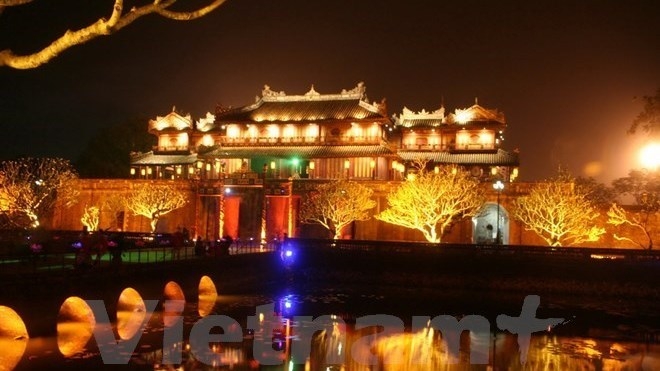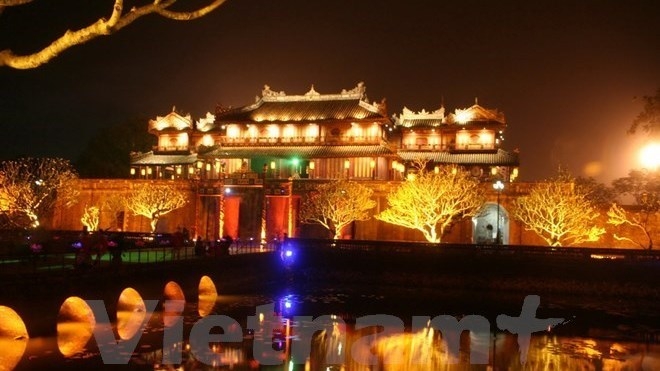
The flow of foreign tourists into the central province of Thua Thien-Hue increased by 31.29 percent to 1.07 million in the first nine months of 2017.

Hue imperial city by night
(Photo: VNA)
The
Republic of Korea ranked first in terms of the number of holidaymakers visiting
Thua Thien-Hue, making up 26 percent of the total number.
In the
reviewed period, the province served a total of 2.78 million visitors. The Hue
Relics Preservation Centre alone welcomed 2.4 million visitors, up 18.55 percent
from the same period last year.
In
September 2017, the provincial Department of Tourism and Traveloka Vietnam
Company signed a Memorandum of Understanding on tourism development, which aims
to connect accommodation establishments, airlines and potential customers.
The
locality also signed a cooperation agreement with the national flag carrier
Vietnam Airlines to promote Hue at domestic and foreign tourism trade fairs, in
addition to increasing flights and launching new routes to the imperial city.
In 2017,
Thua Thien-Hue province expects to attract over 3 million tourists, of which
international visitors will make up 40-45 percent, raking in more than VND3
trillion (US$131 million).
Hue, which
was the imperial capital of Vietnam for hundreds of years, is home to five
heritages recognised by UNESCO, which are the Hue ancient citadel relic complex
- a World Cultural Heritage site; Nha Nhac (Hue royal court music) - an
intangible cultural heritage item; Nguyen Dynasty’s wood blocks - a documentary
heritage item; Nguyen Dynasty’s Chau ban (royal administrative documents) -
part of the Asia-Pacific Register of UNESCO’s Memory of the World Programme;
and literature on Hue royal architecture - a documentary heritage.
The Hue
imperial citadel relic ranked second among the top seven tourism attractions of
Vietnam in 2017.
Source: NDO
A diverse chain of eco-tourism and resort destinations concentrated in Hoa Binh city and the districts of Tan Lac, Da Bac, and Luong Son… Along with the launch of several key high-quality resort tourism projects, these developments have reshaped the landscape and enhanced the appeal of Hoa Binh as a travel destination.
Boasting diverse terrain, a mild climate, and rich natural resources, Cao Phong district is increasingly asserting its place on Vietnam’s tourism map, attracting both domestic and foreign visitors. The district is renowned for its stunning landscapes, majestic mountains, a crystal-clear hydropower lake, and the unique cultural identity of local ethnic groups.
With its pristine landscapes, unique cultural heritage of Muong ethnic minority, and an expanding range of visitor experiences, Tan Lac district of Hoa Binh has fast become a captivating destination for both domestic and international tourists.
Until now, Sung village in Cao Son commune, Da Bac district remains the only Dao ethnic community in Hoa Binh province to develop a community-based tourism model. Beyond its untouched natural landscapes, cultural identity serves as the cornerstone attraction for visitors.
Alongside the diverse cultural identities of the Kinh, Muong, Tay, Thai, Dao, and Mong ethnic people, Hoa Binh province is also renowned as the "capital" of the northwestern Vietnamese cuisine, offering unique and distinctive dishes. At festivals, during Lunar New Year (Tet), or on significant family or community occasions, special dishes are prepared, leaving a lasting impression on visitors.
A Phong Linh (Yellow Tabebuia) flower garden in Thang village, Thach Yen commune, Cao Phong district is currently in full bloom, drawing a large number of visitors.



